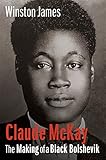Claude McKay : The Making of a Black Bolshevik / Winston James.
Material type: TextPublisher: New York, NY : Columbia University Press, [2022]Copyright date: ©2021Description: 1 online resourceContent type:
TextPublisher: New York, NY : Columbia University Press, [2022]Copyright date: ©2021Description: 1 online resourceContent type: - 9780231135924
- 9780231509770
- African American authors -- Biography
- Authors, Jamaican -- 20th century -- Biography
- Black nationalism -- United States -- History -- 20th century
- Jamaican Americans -- Intellectual life
- Socialism -- United States -- History -- 20th century
- BIOGRAPHY & AUTOBIOGRAPHY / Cultural, Ethnic & Regional / African American & Black
- 818.5209 23
- PS3525.A24785 .J364 2022
- online - DeGruyter
| Item type | Current library | Call number | URL | Status | Notes | Barcode | |
|---|---|---|---|---|---|---|---|
 eBook
eBook
|
Biblioteca "Angelicum" Pont. Univ. S.Tommaso d'Aquino Nuvola online | online - DeGruyter (Browse shelf(Opens below)) | Online access | Not for loan (Accesso limitato) | Accesso per gli utenti autorizzati / Access for authorized users | (dgr)9780231509770 |
Browsing Biblioteca "Angelicum" Pont. Univ. S.Tommaso d'Aquino shelves, Shelving location: Nuvola online Close shelf browser (Hides shelf browser)

|

|

|

|

|

|

|
||
| online - DeGruyter Hitchcock's Romantic Irony / | online - DeGruyter Asian American Elders in the Twenty-first Century : Key Indicators of Well-Being / | online - DeGruyter The Primacy of the Political : A History of Political Thought from the Greeks to the French and American Revolutions / | online - DeGruyter Claude McKay : The Making of a Black Bolshevik / | online - DeGruyter The Liberal Conscience : Politics and Principle in a World of Religious Pluralism / | online - DeGruyter Guardians of Islam : Religious Authority and Muslim Communities of Late Medieval Spain / | online - DeGruyter The Politics of Our Selves : Power, Autonomy, and Gender in Contemporary Critical Theory / |
Frontmatter -- Contents -- List of Abbreviations -- Acknowledgments -- Prologue -- Part I. Jamaican Beginnings: The Formation of a Black Fabian, 1889–1912 -- 1 A Son of the Soil: Jamaica’s Claude McKay -- 2 Holding the Negro in Subjection: Claude McKay’s Jamaica -- 3 You Caan’ Mek We Shet Up: McKay’s Jamaican Poetry of Rebellion -- 4 The Man Who Left Jamaica: Claude McKay in 1912 -- Part II. Coming to America: From Fabianism to Bolshevism, 1912–1919 -- 5 “Six Silent Years”: McKay and America, 1912–1918 -- 6 Fighting Back: Claude McKay and the Crisis of 1919 -- Part III. England, Their England: McKay’s British Sojourn, 1919–1921 -- 7 English Innings and Left-Wing Communism: McKay’s Bolshevization in Britain -- 8 Making Spring in New Hampshire, the 1917 Club, Standing Up, and Thinking of England -- A Coda -- Notes -- Index
restricted access online access with authorization star
http://purl.org/coar/access_right/c_16ec
One of the foremost Black writers and intellectuals of his era, Claude McKay (1889–1948) was a central figure in Caribbean literature, the Harlem Renaissance, and the Black radical tradition. McKay’s life and writing were defined by his class consciousness and anticolonialism, shaped by his experiences growing up in colonial Jamaica as well as his early career as a writer in Harlem and then London. Dedicated to confronting both racism and capitalist exploitation, he was a critical observer of the Black condition throughout the African diaspora and became a committed Bolshevik.Winston James offers a revelatory account of McKay’s political and intellectual trajectory from his upbringing in Jamaica through the early years of his literary career and radical activism. In 1912, McKay left Jamaica to study in the United States, never to return. James follows McKay’s time at the Tuskegee Institute and Kansas State University, as he discovered the harshness of American racism, and his move to Harlem, where he encountered the ferment of Black cultural and political movements and figures such as Hubert Harrison and Marcus Garvey. McKay left New York for London, where his commitment to revolutionary socialism deepened, culminating in his transformation from Fabian socialist to Bolshevik.Drawing on a wide variety of sources, James offers a rich and detailed chronicle of McKay’s life, political evolution, and the historical, political, and intellectual contexts that shaped him.
Mode of access: Internet via World Wide Web.
In English.
Description based on online resource; title from PDF title page (publisher's Web site, viewed 25. Jun 2024)


